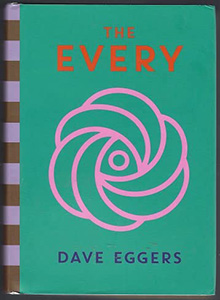 Dave Eggers, The Every, or At Last a Sense of Order, or The Final Days of Free Will, or Limitless Choice is Killing the World (San Francisco: McSweeney's Books, 2021), 577pp.
Dave Eggers, The Every, or At Last a Sense of Order, or The Final Days of Free Will, or Limitless Choice is Killing the World (San Francisco: McSweeney's Books, 2021), 577pp.
The Every begins with a flashback: "Five years earlier, the Circle had bought an ecommerce behemoth named after a South American jungle, and the acquisition created the richest company the world had ever known. The subsummation necessitated the Circle changing its name to the Every, which seemed to its founders definitive and inevitable, hinting as it did at ubiquity and equality." So, imagine the merger of Google, the subject of Eggers's 2013 novel The Circle, with Amazon, Facebook, Twitter, and any other company it wanted to devour. It's too bad that the novel could not have been called Meta.
Employees at The Every are called Everyones. On campus is referred to as Everywhere, and off-campus is called Nowhere. You can only enter the campus after biometric scans. It is a "closed ecosystem." Fitness trackers are required by most insurers and governments. Everywhere is a woke campus that has gone wacky: they don't allow unsustainable or improperly sourced goods, do not use knives or forks, and prohibit single use products or packages. The campus is nut free. The cafeteria serves "faux bacon made of seaweed." Owning a pet is considered animal subjugation. Every 16 minutes employees are reminded to stand and do cardio exercises at their desks. The leaders of Every are unctuous; their "limitless self-regard" is remarkable. The Every is "manifestly a form of madness."
Thank God that Delaney Wells infiltrates this dark dystopia in order to destroy it. She plans to suggest new programs that are so obviously egregious that they will automatically provoke outrage and collective revulsion. For example, one program to help teenagers with depression begins with making sure that children spend more time on their mobile phones so that the Every can collect the requisite data.
Wicked satire is the easy part here, but Eggers turns the black and white feel of the story into an ambiguous gray (at least in parts). Is it better to work for change from inside the system or from the outside periphery? Very unclear. What about all the normal people who work at the Every who get salaries and benefits far beyond anything they could expect elsewhere? One employee just wants to pay off his debts. Isn't Delaney more of a job killer than a whistleblower? There are good bad characters in this story, and bad good characters. What about the genuine good that is at least part of what happens at the Every? And a major part of Eggers's critique is about our own wholesale complicity (thus his clever sub-sub-sub-titles) that demands infinite choices and certainty over freedom and complexity. Every is just giving us what we customers want.
This is all fiction. If you want the non-fiction version, read Shoshana Zuboff, The Age of Surveillance Capitalism: The Fight for a Human Future at the New Frontier of Power (New York: Public Affairs, 2019), 691pp. I read both books back to back, and was taken by how similar Eggers's creative fiction was to Zuboff's documented facts. Both books reminded me of the prophecy of the Desert Father Anthony the Great of the fourth century: "A time is coming when men will go mad, and when they see someone who is not mad, they will attack him, saying, 'You are mad; you are not like us.'"
Dan Clendenin: dan@journeywithjesus.net


